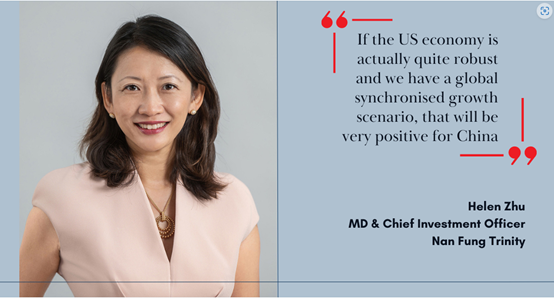August 3, 2023
The Hong Kong-based family office anticipates the delta to turn positive for Chinese assets, and the market is primed for a rebound once economic stimulus kicks in.
Nan Fung Trinity, the family office of Hong Kong business conglomerate Nan Fung Group, is upbeat about the upside potential of the Chinese market in the second half of this year.
“Don’t underestimate the policy impacts,” said Helen Zhu, Nan Fung Trinity’s managing director and chief investment officer. China introduced a basket of stimulus policies during the just-concluded economic meeting of the Chinese Communist Party’s Politburo.
Should US economic growth remain resilient, emerging markets, including China, will present plenty of opportunities for investors as a result of economic normalisation and a weakening US dollar, Zhu said.
“If the US economy is actually quite robust and we have a global synchronised growth scenario, that’s going to be very positive for China as well,” she said.
“Right now, the market looks at China as the glass is totally empty. I’m not saying it’s necessarily going to be totally full, but it could be slightly better than totally empty,” Zhu told AsianInvestor in an interview after the Politburo meeting on July 24.
Amid overly pessimistic market expectations, even slightly improved reality because of the stimulus could create a positive “delta” or difference that drives asset prices higher, according to Zhu, a veteran investor in Chinese markets who formerly managed portfolios and strategies at BlackRock and Goldman Sachs for over a decade.
EMERGING MARKET PLAY
During the Politburo’s economic meeting last month, the Chinese top leadership announced policies for creating a more favourable environment for private enterprises and foreign investors, as well as reducing regulatory pressure on hard-hit sectors such as property. They also pledged counter-cyclical adjustments, monetary and fiscal support, and maintaining equilibrium for the Chinese yuan.
The market reacted favourably so far. The offshore S&P China Select ADR Index and Hang Seng Index jumped 7% and 6.7% respectively, while the domestic CSI 300 was up 4.3% as of Wednesday.
Maintaining a global multi-asset portfolio means Nan Fung Trinity tries to avoid any country or sector-specific bias and to be as diversified as possible in both the public and private markets.
Zhu thinks the key question for the second half is not whether there will be one or two more rate hikes in the US or when, but rather what happens after that – whether economic growth in the US can remain resilient and whether inflation comes off in a sustained manner.
If the data begins to collapse, then longer-duration bonds or cash is a better place to be than in equities, she noted.

But the growth momentum and market expectation is pointing to a more positive outlook for risk assets.
“I don’t think there’s a huge room to further surprise on the upside. If it can be within this broader scope…that’s quite good for the rest of the year,” she said.
For the remainder of 2023, Zhu is focused on catch-up plays in emerging markets, especially equities. From a robust US economy to a peaking-out and weakening dollar, conditions could be “very positive” for non-US markets.
Nan Fung Trinity’s assets are US dollar-dominated, which makes investing in non-US assets more appealing under such circumstances.
CHINA RECOVERY
Within Asia, Zhu named a few markets that can offer good opportunities, including China, Japan, Korea, and Taiwan.
“China is still very underappreciated and people have a dire outlook in terms of growth…The positioning, the sentiment, the expectation, the valuation are all very, very low,” Zhu said.
“I still like China. Everything is about the delta of expectations. When the expectation base is very, very low, it’s easier to beat.”
She said key takeaways from the central government’s policy meeting was a strong desire to stay market-oriented, while still committing to making medium to long-term structural changes, such as promoting domestic consumption, demographic reforms, and the opening up of the capital markets.
But the pace is going to be dependent on cyclical factors.
“Generally speaking, cyclically, it’s very clear they want to support the economy and try to do it in a way that doesn’t go too far against some structural objectives,” Zhu said.
To move the needle and stimulate domestic demand, Zhu believes a holistic package of policies, rather than rate cuts, will be used to jumpstart people’s confidence in the economy and make them go out to consume, buy property, and have a better view of their employment prospects, and outlook for disposable income.
She thinks there isn’t much room left for further monetary support, as the rates are already at a reasonable level from both a domestic and a global perspective. China has a more diverse toolkit to stimulate the economy than just adjusting rates, she noted.
As for the yuan, Zhu doesn’t think the policymakers specifically need to have the currency at a certain level.
“I think they want it (Renminbi) to be increasingly market-oriented. What they don’t want is any kind of one-way expectation or any extreme positioning or financial market manipulation to aggressively influence the currency.”
¬ Haymarket Media Limited. All rights reserved.